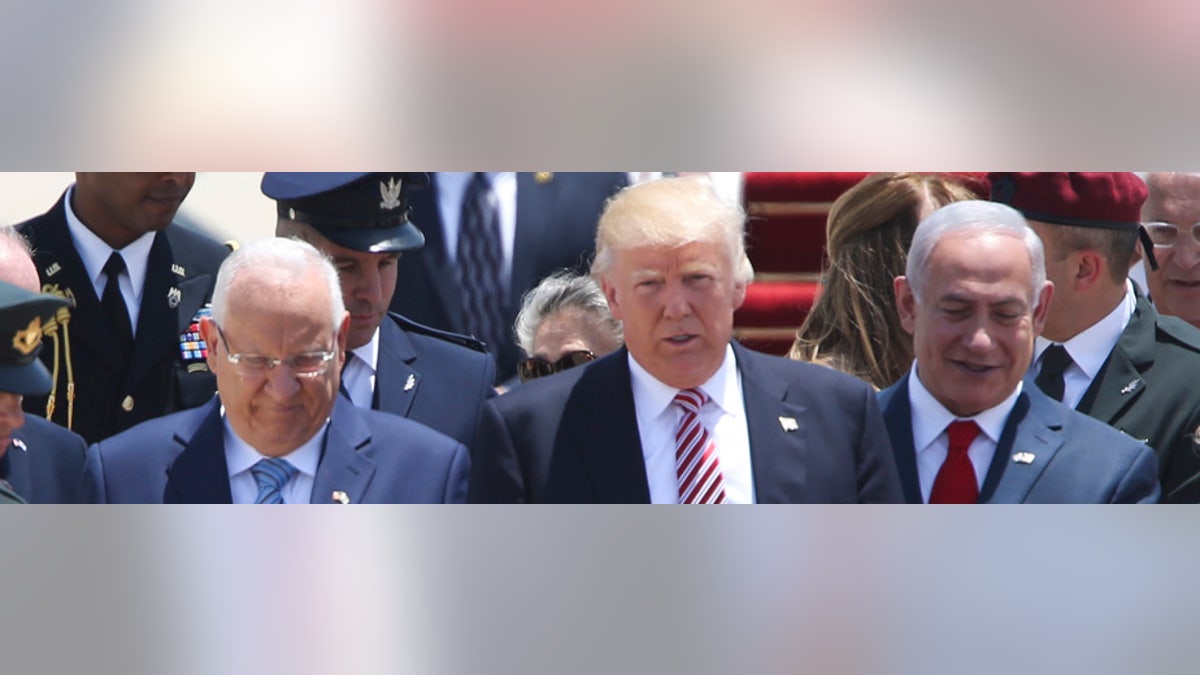
President Donald Trump in Tel Aviv May 22, 2017 ((AP Photo))
Setting out on his first foreign trip, President Trump said he wants to bring “safety, opportunity and stability to the war-ravaged Middle East"--something many presidents have tried, but no president has done.
The President will be in Israel on May 23 – an important date because it’s the eve of Jerusalem Day, the day Israel recaptured Jerusalem in the Six-Day War, ending 1,897 years of gentile control of the capital of Israel.
Many speculate Trump will use this opportunity to fulfill a campaign pledge to move the U.S. embassy from Tel Aviv to Jerusalem. Moving the embassy would tell the world that the United States recognizes Jerusalem as the capital of Israel, recognition Congress wanted the Clinton Administration to give in 1995.
The reason the embassy has not moved is “security concerns” that it would incite the Palestinians in the West Bank. The Palestinian Authority remains steadfast in its efforts to retake East Jerusalem and establish it as the capital of a new Palestinian state, presumably with no Jewish residents. Palestinian President Mahmoud Abbas recently said about Jews in Jerusalem: “Al-Aqsa is ours and so is the Church of the Holy Sepulcher. They have no right to desecrate them with their filthy feet. We won’t allow them to do so and we will do whatever we can to defend Jerusalem.”
U.S. recognition of Jerusalem as the capital of Israel would have enormous diplomatic significance, but would be largely symbolic – it would change nothing on the streets of Ramallah.
Given that both Jordan and Turkey recently have warned of dire consequences if the U.S. moves its embassy, Trump’s visit may or may not result in a change of address for the American ambassador. U.S. recognition of Jerusalem as the capital of Israel would have enormous diplomatic significance, but that significance would be largely symbolic. It would change nothing on the streets of Ramallah.
And those streets in Ramallah are dedicated to terrorists: among them Yahya Ayyash, the man who developed Palestinian suicide bombs; Abu Sukkar, who killed 15 innocent people when he loaded a refrigerator with explosives and detonated it in Zion Square in Jerusalem in 1975; and more recently, Muhannad Halabi, a 19-year-old Palestinian who stabbed two Israelis to death in the Old City of Jerusalem.
If Trump wants to bring stability to Israel and to the Palestinian Authority, he should “follow the money” the U.S. sends to the Palestinian Authority either through direct aid or through the United Nations Relief and Works Agency (UNRWA). The relief money that the U.S. and Europe send every year is the ongoing support that allows the Palestinian Authority to act as a terrorist state.
At a recent White House speech, Abbas said: “Mr. President, I affirm to you that we are raising our youth, our children, our grandchildren on a culture of peace.”
Yet the terrorists who kill Jews are on the public payroll: Abbas is the architect of the Palestinian Authority’s “pay for slay” program, in which families of terrorists receive monthly checks that increase based on the severity of the crime against Israelis. The payments equal 30 percent of the total foreign aid sent to the Palestinian Authority. If you are a U.S. citizen, these are your tax dollars at work.
In 1949, the UN designed UNRWA to help refugees of the Arab-Israeli War of 1948. At the start, UNRWA supported 750,000 people; in 2017, UNRWA supports 5 million people, including the fourth and fifth generation of Palestinian Arabs who evacuated from Israel in 1948.
UNRWA operates 59 refugee camps in Lebanon, Syria, Jordan, the West Bank and Gaza; it is the largest UN agency and its largest donor is the United States. It has been rightly criticized for maintaining the refugee status of people for generations, instead of resettlement and a path to a productive life. After 68 years, it is time to look for another solution.
And for that solution, we look to President Trump’s speech on May 23, the eve of Jerusalem Day, when all of Israel will celebrate the 50th anniversary of the reunification of Jerusalem.
Recognizing Jerusalem as Israel’s capital would send a powerful signal to Palestinian leaders, who, during his meeting with Abbas at the White House, President Trump urged to “speak in a unified voice against incitement to violence and hate … to value and respect human life, and condemn all of those who target the innocent.”
Whether he fulfills his campaign pledge to move the embassy or not, may God grant the President unusual wisdom and the boldness to help bring "safety, opportunity, and stability to the war-ravaged Middle East.”
Gordon Robertson is the CEO of the Christian Broadcasting Network, and executive producer of the upcoming film, IN OUR HANDS: The Battle for Jerusalem, in theaters for one night only on May 23.
